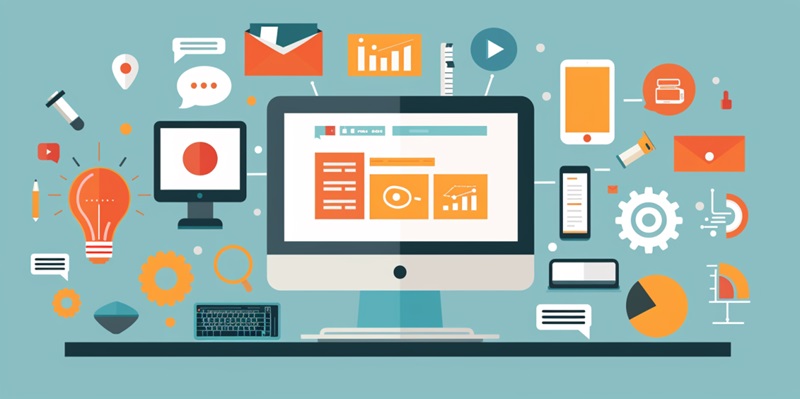Within the dynamic landscape of technology, digital marketing has transcended conventional advertising methods like billboards and print media. At the heart of this transformation lies information technology, which has unlocked new capabilities such as advanced data analytics and engaging virtual experiences. IT’s influence allows marketers to better connect with audiences by personalizing content and adapting strategies on the fly using real-time data.
This merger of IT and digital marketing is crucial for those looking to maintain a competitive edge in an increasingly crowded marketplace. By integrating IT’s innovations, marketers can capture the attention of their audience more effectively, offering personalized interactions and experiences that were once impossible. As technology evolves, the synergy between IT and digital marketing grows stronger, making it imperative for professionals to understand and leverage this relationship to succeed.
Artificial intelligence has quickly risen from an intriguing concept to a cornerstone in digital strategies. AI’s ability to harness vast amounts of data and turn them into actionable insights is a game-changer. Real-time interactions that once required human intervention are now managed by AI, providing instant customer service and enhancing the overall customer experience. Machine learning algorithms digest customer behavior, enhancing predictive analytics to fine-tune marketing strategies for maximum impact.
These AI-driven systems can predict consumer needs even before they’re explicitly expressed, allowing businesses to impact the decision-making journey with personalized offerings. By analyzing purchasing history, search patterns, and engagement, AI can segment audiences with precision, leading to highly targeted and successful marketing campaigns.
Revolutionizing Experiences with Virtual and Augmented Reality
Virtual and augmented reality are no longer confined to the gaming universe. These technologies have claimed their stake in the marketing domain, delivering astonishing levels of immersion. Through VR, customers can embark on virtual tours, explore products in a 3D space, or experience services in a simulated environment, all without leaving their homes. AR adds a layer of interaction to the real world, enabling users to visualize products or information overlaid onto their physical surroundings.
These rich, immersive experiences offer a new frontier for marketers to craft compelling brand stories that resonate on an emotional level, fostering customer loyalty. As evidenced by numerous successful campaigns, VR and AR possess the potential to revolutionize the industry further as technology becomes more affordable and widespread. Businesses that can tap into this potential not only differentiate themselves but also offer a glimpse into the future of experiential marketing.
Leveraging the Internet of Things for Connected Marketing Strategies
The arrival of the Internet of Things (IoT) has meant that everyday objects are now capable of communicating valuable data. For marketers, the possibilities are plentiful. A seamless network of interconnected devices offers real-time insights into how consumers use products, opening up opportunities for hyper-targeted content and personalized customer journeys. This data-rich environment feeds into strategies that can predict and respond to consumer behavior more effectively than ever before.
However, as advantageous as IoT is, it’s not without challenges. With emerging concerns over data security and the necessity for cross-device compatibility, marketers must address these issues to build trust and deliver experiences that are not only smart but also secure. By overcoming these hurdles, companies can ensure that the benefits of IoT-generated insights translate into positive outcomes for both the brand and the customer.
The Impact of 5G on Mobile Marketing Dynamics
The deployment of 5G networks is set to turbocharge mobile marketing. Its promise of lower latency, higher speeds, and more reliable connections upgrades the cellular landscape, paving the way for enhanced mobile experiences that were previously impossible. With 5G, live streaming becomes seamless, augmented reality is more accessible, and video content can be delivered at higher resolutions without the dreaded buffering symbol.
This transformative network capability empowers brands to adapt their strategies in real time, tailoring marketing campaigns rapidly to shifting consumer behaviors and market trends. Marketers who leverage the full potential of 5G have a decisive competitive advantage, delivering content and experiences that meet the expectations of the increasingly mobile-centric consumer base.
The Rise of AI-Powered Influencer Marketing Platforms
As AI revolutionizes the way brands identify and collaborate with influencers, the landscape of influencer marketing is being rewritten. AI-powered platforms effectively match brands with influencers who resonate with their values and audience, fostering authentic connections that drive engagement. These tools streamline the selection process, carving out a niche for dedicated micro and nano-influencers revered for their genuine content and ability to garner trust.
The appeal of such influencers lies in their perceived authenticity and targeted reach. Rather than casting a wide net, brands now focus on specific segments, where the influence is direct and conversion rates are higher. This marks a strategic pivot towards quality over quantity, emphasizing the relevance and resonance of influencer partnerships in attaining successful outcome-driven campaigns.

